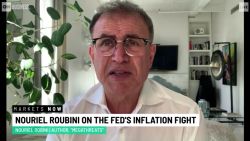A version of this story first appeared in CNN Business’ Before the Bell newsletter. Not a subscriber? You can sign up right here.
Stocks have generally shrugged off the coronavirus scare — briefly falling when the outbreak looks to be accelerating before continuing on an upward trajectory.
In other corners of the market, however, the coronavirus has been much more consequential.
Brent crude futures, the global benchmark for oil prices, had their best day since early January on Wednesday, finishing up 3.3%. But they’re off again on Thursday after the International Energy Agency said that quarterly global oil demand will shrink for the first time in more than a decade — reinforcing broader concerns about the energy outlook.
Brent prices remain near $55.10 per barrel, well below the six-month average of $61.79. The S&P 500’s energy sector, meanwhile, has shed 9.1% this year. The broader index is up 4.6%.
Concerns about demand from China are also weighing on commodities like copper. ING strategists, in recent note to clients, explained the problem this way: “China is the kingpin of the global commodities market. The longer factories remain closed, travel restricted and construction stalled, the larger the ramification for commodities demand.”
Trouble in Europe: The euro has also come under strain as investors pile into the US dollar, which is considered to be a safe-haven investment. The currency has hit its lowest level against the dollar since May 2017 as concerns about Europe’s economic resilience grow, particularly in Germany. The euro has declined seven of the last eight days, Deutsche Bank points out.
Stocks aren’t totally immune to fears about the coronavirus, falling Thursday after the Chinese province at the center of the outbreak reported a record spike in deaths. But Ed Yardeni, president of investment advisory Yardeni Research, told clients Thursday that “most S&P 500 sectors have also bounced back nicely from the coronavirus scare.”
Looking beyond stocks, though, the market rebound could be more drawn out — especially as countries other than the United States begin to tally up the economic impact.
Barclays CEO under investigation over Epstein links
The American chief executive of Barclays (BCS), Jes Staley, is being investigated by British regulators over his relationship with disgraced financier Jeffrey Epstein, the bank said Thursday.
The details: Barclays said the relationship between Staley and Epstein was the subject of an inquiry from the Financial Conduct Authority, to which Barclays responded. The regulator then launched a probe — still ongoing — into Staley’s characterization of the relationship to Barclays, and what the bank then told regulators.
Stock drop: Shares in the bank were trading as much as 3% lower in London on Thursday morning.
Staley has run Barclays since late 2015. Prior to that he worked for more than 30 years at JPMorgan (JPM) Chase, where he served as head of the investment banking division. JPMorgan (JPM) declined to comment.
In its statement, Barclays said Staley had developed a professional relationship earlier in his career with Epstein, who died in jail last year while awaiting trial on sex trafficking charges. The bank said Staley had told the board that he had no contact with Epstein since becoming Barclays CEO in December 2015.
The board said Staley still has its full support. But the investigation adds pressure on a CEO who has already faced blowback from shareholders over his commitment to investment banking, as well as growing calls for the bank to wind down its financing of fossil fuel producers.
Why BP’s new climate targets are a big deal
BP, facing growing pressure over the climate crisis, has pledged to reach net zero emissions by 2050 or sooner, putting the rest of the oil industry on notice.
The promise: Bernard Looney, the company’s new CEO, has pledged to cut greenhouse gas emissions from its global operations, as well as emissions that result from the oil and gas it produces, to net zero by 2050. By that same date, BP aims to halve the carbon intensity of all the products it sells. It’s reorganizing the firm to make this happen.
Details about exactly how BP will reach these goals remain scant ahead of a presentation in September. Still, the commitments are the most ambitious from any major oil company to date. Shell has set targets to rein in emissions from its products, but hasn’t gone as far, while America’s Chevron and ExxonMobil lag far behind.
“It’s clear that net zero is where investors are pushing companies,” Andrew Logan, senior director of oil and gas at Ceres, a nonprofit that lobbies for companies to take action on climate change, told me.
BP’s shares rose 1% after the announcement, indicating investors could get on board. But low oil prices could make life difficult for BP as it attempts a major transition. Shares are off 3.5% on Thursday.
Up next
Airbus (EADSF), Alibaba (BABA), Nestle (NSRGF), Nissan (NSANF), Kraft Heinz (KHC) and PepsiCo (PEP) report earnings before US markets open. Cloudflare (NET), Datadog (DDOG), Expedia (EXPE), Mattel (MAT), Roku (ROKU) and Yelp (YELP) follow after the close.
Also today: US inflation data for January arrives at 8:30 a.m. ET.
Coming tomorrow: US retail sales for January are expected to highlight the strength of the American consumer.
























